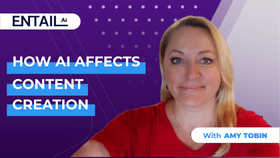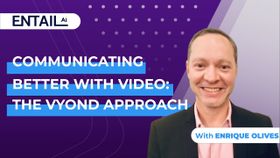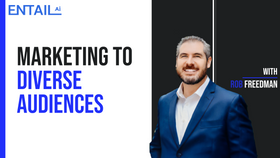Sandra Stepan gives you the rundown on influencer marketing—and how to do it well
Traditional marketing methods struggle to capture consumers' attention, and brands are turning to influencers to tell their stories.
Updated February 28, 2024
AI Summary
Influencer marketing has become a powerful tool for brands to reach their target audience in an authentic and engaging way. By working with influencers, brands can reach new and larger audiences that would otherwise remain untapped.
In a candid discussion with Sandra Stepan, a seasoned digital marketing and e-commerce expert, we explore the intricacies of influencer marketing and how it has become a pivotal element of modern marketing strategies.
Sandra shares invaluable insights on the importance of diversifying traffic sources, the transformative role of social media, and the art of building lasting partnerships with influencers. Embracing influencer marketing and working with experts is becoming essential for brands looking to scale in today's digital-first world.
I'm happy to have Sandra Stepan with us today. Hi, Sandra. Very nice to have you on board.
Very nice to be here.
Maybe you can tell us a little bit about yourself.
Absolutely. I'm a digital marketing and e-commerce expert. I work with e-commerce brands looking to scale by diversifying their sales and profit sources. I usually do this by building more broadcast channels like Pinterest, social media marketing, influencer marketing, and email marketing. They're digital assets and systems for content creation on autopilot.
And when you say more broadcast channels, you mean like you help them develop new marketing channels through different social media.
Yes, that's exactly it. Most e-commerce brands, especially when they start to scale, usually rely on a couple of different traffic sources, mainly Facebook ads, Google ads, and maybe some SEO content marketing.
What we've seen is that when you start diversifying your traffic sources and sales sources, like building a broadcast channel, whether that be an email list or a social media digital asset, conversions happen quicker, conversions happen cheaper, and when traffic comes from different places, a lot more sales happen.
The buzz with influencers
Okay. That's interesting because we also see now that more and more brands are shifting bigger budgets into influencer marketing. But do you see, from your experience with brands that you work with, brands succeeding and building sustainable, scalable channels, getting significant traffic from social as well?
Yes, absolutely. Social media has been getting a lot more traction, especially with user-generated content-focused social media, because brands are really understanding that social media is not just a 'from me to you' type of channel. It's very intertwined, talking about ourselves but also serving our customer, our follower, and offering an amazing user experience by answering your questions.
And then, adding something like user-generated content, where social media users can see content created for your brand by influencers, micro-influencers, and content creators, has added something else in the mix that just makes social media so much more creative, more powerful, and brands can really leverage it for more money.
And do you think, when brands now communicate with their audience, it feels like brands are now competing less with other brands but more with influencers because, like you're saying, it's not just that they need to put out content for branding, they need to communicate with their audience, provide value, answer questions, etc. And it feels like most of those questions or topics are covered by influencers rather than brands because influencers can speak to their audience in a kind of authentic way.
First of all, you nailed it with influencers talking to social media users like they are more authentic or like their peers.
People have time; they binge-watch Netflix shows. It's just about the attention, right? So influencers have done something really brave and really creative, which was talking to their audience peer to peer in an authentic way.
So, especially during COVID when everybody hopped on TikTok, influencers are talking to their audience in an authentic way. They're not even putting makeup on. They're just letting words out without a filter, and their audience started to like that. So, in comparison, switching from almost like a corporate stiffness to talking authentically, eye level with your audience.
Solving the challenge
I actually think embracing content creators and influencers and working with them instead of trying to compete against them, because if you're trying to compete against someone who can just hop on camera whenever there's something relevant, and they don't have to wait for those extra processes of approval and can hop on the trend, they're going to win, right? And then these influencers have already created an audience that likes them for them.
Instead of trying to compete with them, don't do that anymore as a brand.
I would say, embrace it, work with influencers, and develop influencer partnerships. See how you can collaborate so that you can also leverage that influencer's audience, which can also be your audience. I think that's the key.
And brands adopting that strategy, is it now something more and more brands are moving into?
Yes, so last week, there was a huge campaign from Stanley Cups. The Stanley Cup is a mug with a lot of influencers, and it has a straw, and then you always see those influencers, the straw and the mug and they're drinking their water.
Really in a campaign, there was this TikToker, who I think was an influencer already, and her car burned down. There was a fire, her car burned down, and she opened the door, and the only thing left standing in that car was a Stanley cup. And in the comments, people were like "is there coffee still warm?" And then she started making this series of videos from that, from those comments, right? Because on TikTok, you can take comments and basically turn them into a response video. She started creating all these videos based on that one seed comment of "can you still use your Stanley Cup?"
So she's taking more photos of her burned-down car. Literally, the car was black. It was almost down to ash. And she's like, people are asking me if I can still drink from my Stanley cup. And she made a series of videos. Then the president or the CEO, someone from Stanley Cup, actually went on [TikTok] Live and they said they were going to buy her a new car. So that was a brilliant campaign because they're spending 30,000 on a car, but that video got millions and millions of views.
If you think about a brand, how much would they spend to be seen by millions of people? Think about all the brands that sponsor sports events. We just watched ATP, and we watched Novak Djokovic. There are all of these brands that you always see, like Rolex, for instance. Think about the money, the millions they spend to be seen in those places versus Stanley Cup.
Building your influencer strategy
Yeah, that's amazing. But do you think brands should focus on seeking viral moments or aim to build long-lasting partnerships with influencers?
I'm always a fan of long-lasting partnerships. The viral pieces are great, but you also have to be a known brand, a quite large B2C brand in order to go viral. But I do think that brands should build longer-term relationships with influencers and also build a proper strategy. When an influencer partnership doesn't work out, it's usually because you did not set up a target or goal for your influencer partnership.
If you're not picking an influencer whose audience really aligns with yours, you're not going to have traction; make sure that you select influencers whose audience aligns with yours.
Start with your targets, go into your budget, go with the influencers that align with you, and make sure that your offer is relevant to their audience, and then set up those tracking and analytics tools in place.
I know it's a very general question, but how much does influencer marketing cost? Are there benchmarks for micro-influencers or mid-range? Can you say anything about that, like how much should brands expect to pay?
For sure. When it comes to developing a budget for your influencer marketing, I would always say, go back into your margins. What you would pay for an ad, for instance, or to acquire a new customer through an ad, that's pretty much what you could say you can spend on an influencer.
Also, think about the added benefits of doing influencer marketing. Getting that one sale is great. But then also make sure you're getting the content, you're getting the mentions, you're getting the followers, and you continue building your email list.
There's an added benefit to it. When it comes to cost benchmarks, you can even do it for free, by the way. You can still do influencer marketing, maybe not necessarily influencer marketing, but content creator marketing for products only. You can send them products, and ask them to create content. They can give you a shout-out. They can tag you in their posts. Sometimes micro, macro, and nano influencers may even be more beneficial for your brand than macro influencers because, especially if you're a brand that hasn't done influencer marketing or your brand is still scaling, you don't know what works for you.
Spending a lot of money on an influencer campaign may not make sense. It may make more sense to go with a nano influencer, get them to create content, and see what kind of content your audience responds to best.
Let's say you close a deal with an influencer; you pay them for their posts. Do you need to agree on terms in advance in terms of whether you can use their content as well? Can you post their content on your social media? Can you use it for your paid ads? What's the fair use you can do with the content that they create?
Yes, you want to have all of those details really set in stone in an agreement before you pay the influencer and before they start creating content.
When you are negotiating with the influencer, let's say I want you to create some content for me, I say "Okay, cool. I am going to pay you a thousand dollars. I'm going to send you some product, and I want you to create at least one TikTok video, an Instagram reel, and maybe an Instagram story. I will give you some information about my brand because I want you to have your own flair. You're an influencer for a reason, and users like you for a reason. However, there are some key items that I want you to mention about my brand." And perhaps, "I may even send you a mood board to show you what kind of content I think would be best." And then I will put it in that agreement or contract.
I will say in writing that I have the rights to the content and that I can use the content without any additional liabilities on your end. I can use the content for anything I feel is a fit. That can be anything from ad creatives to TikTok, Pinterest, Instagram, and all of our social media or digital assets.
Not every influencer will agree to do that. And some influencers will ask you to pay extra for that. So be careful with that side of influencer deals as well.
So it seems like doing a deal with influencers, getting the details right, is both an art and a skill. Once you get the hang of it, is it something you can standardize, or does it need a lot of tweaks and customization between influencers?
No, I think you can standardize it. I think you can definitely assembly line it and just find your flow, find what works for you, find what kind of influencers work for you.
You can develop a system where it's literally like a Kanban [or project management software]. We're doing our research, we're contacting influencers, we're negotiating, we're tracking the content, and we rinse and repeat. These are good for the future, or let's move along. So absolutely, you can create a repeatable system with it.
Measuring influencer marketing
What about checking, as you mentioned before, making sure that the audience is right? If you're starting to work with an influencer, if you're building a partnership, you want to make sure that they also target your target audience. And some of them may have a lot of followers, but maybe only a certain percentage of their followers is relevant to you. How do you check that in advance?
With an influencer marketing tool, you actually have the capability to check whether or not an influencer's audience is a good fit for you.
Most tools will give you, in their paid subscription usually, information like what kind of hashtags they use, what kind of things they talk about, where their audience lives, audience demographics, and what their audience talks about. So you can take all of that data and then use it in your decision-making.
Now, if you're doing just content creation and you're just looking at content creators and want some nano influencers to get things going, maybe it's not as important for you because you're looking at content creation. But when you're starting to pay influencers, use a tool to look at their information and their follower data.
It's never 100 percent accurate, but it is more accurate than just having a look on Instagram and seeing if you think the influencer will be a good fit for you. A tool will give you that information a lot more accurately.
That's an important tip. You're saying, basically, before you start to work with an influencer, to get a glimpse of their own analytics to know to see their own data, not just the estimated data from the tools, but to see the real data.
Exactly. And an influencer that is there to do business will do that for you.
If they're trying to hide that from you, that is a huge red flag and means that they're either not interested in this partnership or they have something to hide, and maybe they're not as truthful as you thought they would be about their audience and about their success with their influencer ship.
It's a bit of a red flag. Once you're in negotiations, ask them to send you a snapshot of their own analytics.
That seems really valuable. That's something you definitely need to know. We're more in SEO, but some clients wanted to be featured on a website that wanted them to pay, I don't know how much exactly, but thousands of dollars just to be on a list of the best apps. I told him, the basic thing is to ask them for; a screenshot of their analytics to see how much traffic this page gets. And also maybe, if possible, to see what kind of organic traffic and searches go to this page. So you can see whether there's really a conversion potential there or not.
Exactly.
Getting customers to create UGC
That's important. Influencer marketing can get quite expensive as well because small influencers will start from around $500 per post. And if you want to do that at scale and want to work with multiple influencers, it can get quite expensive.
Do you think there are also brands looking to create their own content? We touched on that in the beginning, but do you think there are certain activities that brands can do in-house to build their own brand equity, become an influencer, or maybe hire people who can create authentic content influencer-like content in-house? It doesn't look like a directed video, but just like authentic UGC.
Actually, one of my favorite things to do when I start working with a brand that is looking to diversify their content and their traffic sources is to set up a system to get their own customers to create content because who is better at creating content for you than the customers that have purchased from you, right? If you're a brand and you're selling products, especially in the B2C space but B2B as well, and you have repeated sales, setting up a system to get your customers to create content [is especially useful].
One of the easiest things I've done for brands was to set up a little physical insert in the packages. When the packages have multiple layers, let's say there's a box and tissue paper before they even open that actual product. We would have an insert that would say, "Stop there! Read the back of this first." And then we will say, "Thank you so much for your purchase. You've made our day. We hope our product will make your day. By the way, do you want to win a free whatever product it is?"
We will set up a monthly draw, and we would say, "Snap a photo or a video of you wearing this product, upload it on Instagram, tag us, and you automatically enter to win whatever gift card," whatever we have set up, or you can give them like a 10 percent off or 20 percent off, whatever makes sense for you as a brand to give as a little bit of incentive. So that would be one of the ways.
And then, the second way would be to have in your post-purchase email marketing flow, have one email that is geared towards that. "Hey, Sandra, we're so happy you bought from us. By the way, do you want to score a free product or do you want like a discount for your next purchase? Take a photo of this product and upload it to Instagram. Enter for a chance to be featured and tag us." So, creating content on autopilot is actually easier than you think it is, especially if you have the volume of sales.
I would set up automated processes to get your customers to create content. That's one thing you can do. The other thing you can do is, like you said, you can hire content creators to create content for you that is authentic, that feels natural, feels real.
If I have a product brand and let's say my product is, I don't know, it can be beauty. Let's say it's lipstick, right? I want to promote this pink lipstick. Find influencers or content creators that are not necessarily in beauty, but maybe they are in other niches. Super trendy right now is videos where people are talking and they're doing their makeup. And people are asking them, "Hey, where's your lipstick from? Where's your mascara from? Where's your top, your necklace or whatever from?" So you can incorporate products.
You can do that as well. I think you can create content with experts in different fields. I know a company that does that, that enables you to hire experts in different fields to create content for you so that you get that reach, you're broadcasting your message, you're broadcasting your keywords, but you don't have to do the actual heavy lifting in-house.
Creating authentic content in-house
Our model, by the way, you've been here a few times, so you know, but it is really about that [expert content creators]. It definitely applies to companies where their audience is looking for information or educational information. So any company that sells products in health, or like I said, most of the B2B companies.
Fashion or jewelry or anything like that where it's more about just about models. But, for most companies, what happens is their audience is looking for information and to get that information from within the company. It's very difficult because you would need to have the executives busy in that process and that would make it very difficult to get ROI positive on that. So you find many other experts who are happy to share their expertise and get the exposure as well.
And it's a win for both sides.
I agree because sometimes the executives of that company, they're actually not the best-suited people to be on camera, right? Whether that's because they don't go on podcasts or expert interviews too often, or maybe they just don't, they haven't done the system in-depth enough to go and talk about it versus someone who lives and breathes it.
If we're talking about influencer marketing, I can sit here and talk about influencer marketing all night. Some of the businesses that I work with have built businesses of 20, 30 million a year. They have never reached out to an influencer. The executive has never reached out to an influencer.
They are involved in so many other activities in the company that they can't go to the depth that you will need in order to rank for those keywords in order to have your message and your information broadcasted to a point where it gets the traffic and it gets the sales and it gets the meetings and it gets the demos.
Future growth of influencer marketing
And so, back to the beginning, having spoken so much about influencer marketing now, what do you feel, in terms of e-commerce marketing budget, an average company these days, what is the percentage that they spend from their marketing budget on influencer marketing? Do you think it's going to increase over the next years?
Yeah, I think influencer marketing is going to increase. I don't have the numbers off the top of my head. I know that I've done research on this, but as you mentioned, there are brands right now that are spending as much as 50 percent of their marketing budget on influencer marketing.
I would say right now, it's still pretty low. I would say from my research, most of the companies that are doing influencer marketing out of their total marketing budgets, are spending maybe 10 to 20 percent on influencer [marketing]. Most companies are spending under 10 percent on influencers, but those are companies that are not doing influencer marketing. They're not doing a lot of other good things in marketing, but the ones that are spending probably between 10 and 20%.
Even though social media users know influencers are paid to talk about a product, they still trust them more than they trust ads by brands. It's crazy. It's something like 80 percent of millennials, I think, trust influencers' opinions over a brand's opinion.
I think that's something that really needs to resonate with a lot of brands because I think that's super important.
I think the brands that are saying, "Oh, influencer marketing doesn't work," is the same vibe and energy that I used to see from brands four or five years ago when they said Facebook ads don't work.
What do you mean Facebook ads don't work? Like you just haven't figured out how to run campaigns, you haven't optimized your funnel, and you haven't worked on your landing pages. You can't just say Facebook ads don't work. Facebook ads don't work by themselves. You have to enable them to work. So I feel like with influencer marketing I'm getting the same energy from the brands that are saying influencer marketing doesn't work.
You are doing your research, you are planning it out, and you're talking to the right influencers. Maybe influencer marketing is still a bit more subjective than something like Facebook ads. For instance, where Facebook ads are the machine, it's more systemized, but influencer marketing can be a little bit more fluid because every influencer is different. Maybe that's the problem, but influencer marketing does work.
Smaller influencers, greater connection
I've also seen a trend with some of our clients where they say they're getting better results with smaller influencers with more engaged, more intimate communities around them. Is that something you've experienced? For example, if you're in fashion and you're selling women's clothes and you reach Rihanna, who is a huge celebrity, then you are probably going to generate a lot of sales.
But what I've seen is with brands of self, for example, period and fertility trackers for women, where it's more probably like an intimate subject. Smaller influencers with closer communities and so on, this is where they're getting better results as opposed to larger influencers.
Do you think that has to do with the type of product you're selling, or would that work across all industries?
I personally think it would work across all industries. I've experienced that as well. Smaller influencers with more intimate communities tend to have more engagement, usually because they've found their niche and they know their audience well enough to broadcast the right message.
It depends on your goals. Even when you are a company that's like Coca-Cola. So everybody knows Coca-Cola. They don't need to have ads in order to sell their product.
However, we all know the Coca-Cola ads during Christmas time, right? So with the polar bears and the Santa, I grew up with those and they're just like warm and fuzzy. You also don't see Mercedes advertising too much. You may see Mercedes sponsoring, right? So again, I just watched the ATP tennis tournament.
When you're looking at who sponsors that it's usually Rolex. So again, Rolex doesn't need you to see an ad on Facebook in order to buy. If you are a big brand and you're looking to maintain your status, you're looking for that brand awareness. If you want to remind your community, and your followers, and you want to remind buyers that you are the big boss. You're the big wolf. Then you want to go for those big strategic partnerships because you want to be associated with them.
However I have seen small brands endorsed by Oprah that were unsuccessful because it was not sustainable. It's a once-off type of deal. For a few months, they had sales, but then they hadn't structured everything else enough to be able to sustain that. So I have seen that exact case scenario where it was endorsed by Oprah and sales shot up and then went back down.
Now you're a big brand. You have the status. You want to be associated with Rihanna. Very different thing, right? But if you're looking to reach your audience with deeper messages; going for those sales. The smaller influencers will work better for you.
Even Coca-Cola think about it. If you're in a bar and then the bartender opens a can of Coke or, like here in Europe, we still have those glass bottles, and they look so good when they're cold and frosty. It makes you buy for me. I don't want to buy a Coke if I see a billboard of a Coke. But if we're in a bar with just 50 people in there and the bartender in front of me opens it up and pours it, I want a Coke.
So, even though Coca-Cola is a big brand, the goals are different.
So I think it can go across all industries. I think it really depends more on your goals, the type of business and the type of partnership you want. And now you want a Coke, eh?
Who is influencer marketing for
Okay, you made me think of Coke, definitely. What do you recommend to your clients? Do you push them towards influencer marketing or does it have to do with the type of client or where they're at and how big their business is, or how do you usually recommend this to clients, working with influencers?
I usually look at where they're at with their sales, and what stage they're at because a startup and someone who's just scaling or someone that has scaled and they're looking to diversify or create more strategic partnerships will have different needs.
What I like to do is start a little bit smaller, where if it's a medium-sized brand, a brand that has some success: they're selling through Facebook or Google ads, or if it's a B2B company, they're doing their own outreach. I like to do a blend of content creators and influencers because I want to show them first how to create a system, what they can expect, and the kind of work that is involved. That helps align the expectations and align the workflow.
Then, I get them to see the content created by these nano influencers or content creators for the purpose of content creation and then compare the difference with the ones that we pay. I typically will not jump into even a macro influencer of 500,000 followers unless they've done influencer marketing before. I need to see what kind of influencer marketing they've done before and what kind of campaigns have worked for them.
It's the same as running a Facebook ad. If I'm starting Facebook ads for a company, I'm not going to go with a budget of a hundred thousand dollars a month unless they're already doing that and I'm optimizing it. But if they are doing 10K a month in ads, then I'm going to keep it at 10 to 30K for now and then scale from there.
So, I look at where they are, what their needs are, and I try to start a little bit smaller, prove the concept for them and then have that repeatable system and then scale from there.
That was super interesting for me. I haven't done any influencer marketing, so I only hear about it from clients. So it's really nice to hear firsthand from you. Is there anything else you'd like to say or add at all?
Give influencer marketing a try, regardless of your business type.
It's a valuable tool in the marketing toolbox, offering the chance to have your product or service endorsed and talked about by others, which can significantly enhance your marketing strategy.
Some sort of influencer marketing, content creator marketing, can work for anybody, whether you're a B2B, B2C, SaaS products, service. Just having someone endorse you and talk about your product or your service and getting that content created on autopilot is such a valuable tool to have in the marketing toolbox. Try it out.







